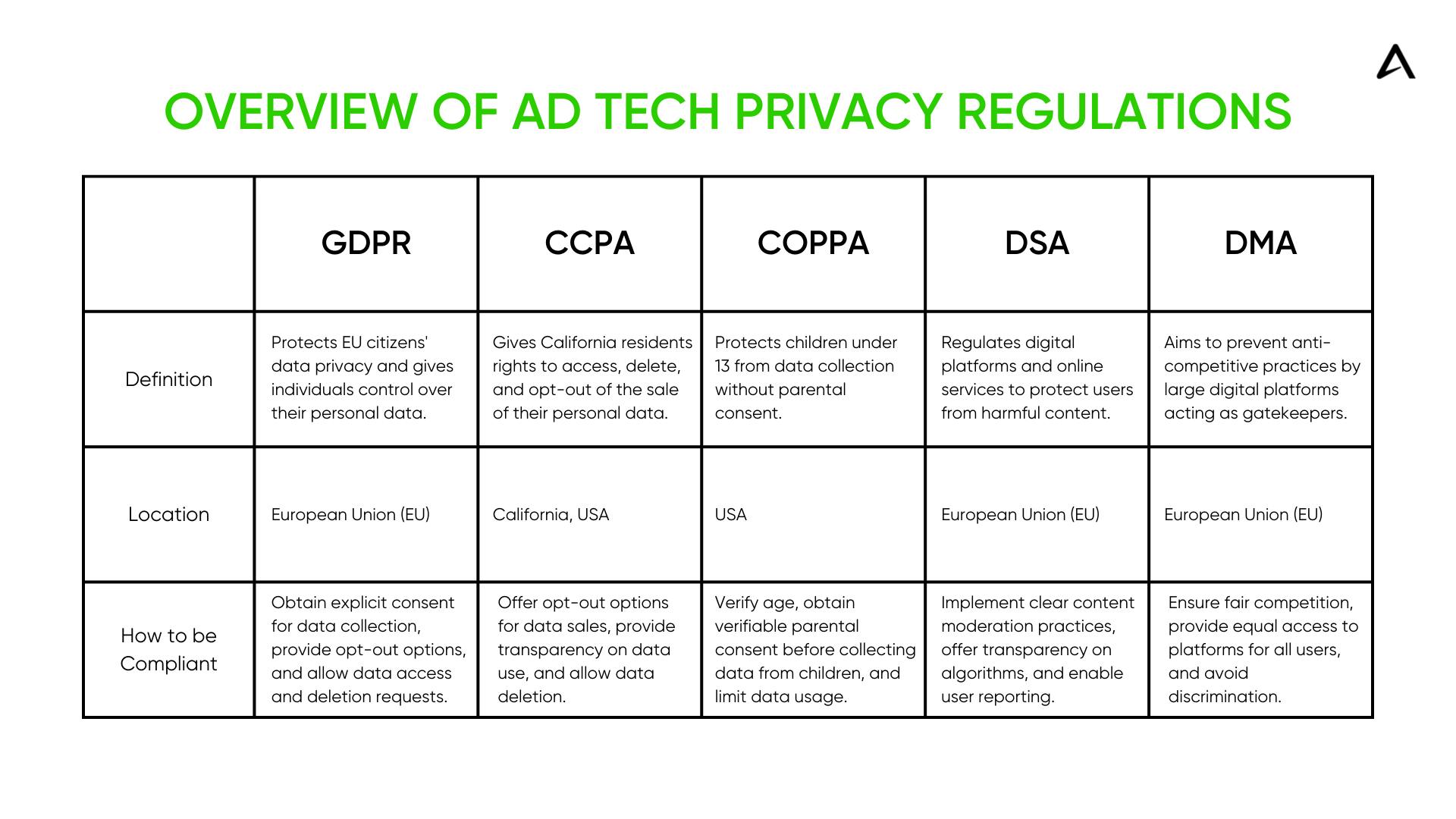The Impact of Privacy Regulations in Ad Tech in 2025
As we celebrate Privacy Week this year, it's a good time to reflect on how far we've come in the world of ad tech and data privacy. From a regulatory standpoint, 2025 is shaping up to be a pivotal year. Privacy regulations continue to evolve, presenting new challenges and opportunities for businesses, especially in the realm of advertising technology.

As we celebrate Privacy Week this year, it's a good time to reflect on how far we've come in the world of ad tech and data privacy. From a regulatory standpoint, 2025 is shaping up to be a pivotal year. Privacy regulations continue to evolve, presenting new challenges and opportunities for businesses, especially in the realm of advertising technology. As governments across the globe tighten their grip on data protection laws, it's crucial to understand how these rules impact the ad tech ecosystem, publishers, advertisers, and consumers alike. In this blog post, we will delve into the current landscape of privacy regulations, explore their impact on ad tech, and discuss how companies are navigating compliance in 2025.
The Importance of Privacy Laws in Ad Tech
In recent years, privacy has become a major talking point, especially as online businesses and advertisers collect vast amounts of consumer data. The importance of privacy regulations cannot be overstated in the context of ad tech, where data privacy is foundational to how ads are targeted, delivered, and measured.
Ad tech companies rely on vast datasets to fuel real-time bidding and ad targeting, and these practices often raise concerns about how personal data is collected, stored, and shared. As consumers become more aware of their digital footprint, governments worldwide are introducing new privacy laws to protect individuals' rights and hold businesses accountable.
The regulatory environment is evolving quickly, and ad tech companies must ensure that their data practices align with current privacy laws. Failure to do so could result in hefty fines and reputational damage, which in turn impacts the entire advertising ecosystem.
For publishers, navigating these regulations is critical. Many publishers rely on ad tech to monetize their content, but this means they must also be diligent in ensuring that any data shared with advertisers and third parties adheres to privacy guidelines. Publishers are at the intersection of privacy compliance, and understanding the data privacy landscape is essential for staying ahead in a competitive, increasingly regulated market.
The Ad Tech Ecosystem
To understand the impact of privacy regulations, it’s important to first have a clear picture of the ad tech ecosystem. At its core, ad tech is a complex network of technologies that enable advertisers and publishers to target, deliver, and measure digital ads. This ecosystem includes several key players:
- SSPs (Supply Side Platforms): Platforms that help publishers sell their ad inventory.
- DSPs (Demand-Side Platforms): Platforms that allow advertisers to purchase ad inventory programmatically.
- DMPs (Data Management Platforms): Systems that aggregate, analyze, and segment data for ad targeting purposes.
- Ad Servers: Technology that delivers ads to a user’s device.
- Retargeting: The practice of showing ads to users who have previously interacted with a brand.
- Ad Fraud: Fraudulent activities in which advertisers or publishers are misled into paying for invalid or non-human traffic.
Each of these players relies on data—often in real time—to deliver relevant ads to the right users. However, as privacy regulations tighten, there is increasing pressure to ensure that all of these processes comply with various laws governing data protection and privacy.
The rise of privacy regulations has forced the entire ad tech ecosystem to reevaluate how they collect, store, and use consumer data. Companies must ensure that they are only collecting the necessary data, that they have consent from users, and that they are fully transparent about their data practices.
Data Sources in Ad Tech
In ad tech, data is often categorized into three types: first-party, second-party, and third-party data. Understanding these distinctions is crucial when discussing privacy regulations.
- First-Party Data: This is the most valuable and privacy-friendly type of data. It refers to data collected directly from users through interactions on a publisher's website or app. Publishers collect first-party data from their audience through activities such as website visits, purchases, or sign-ups. Because this data is collected with direct user interaction, publishers are often in a better position to obtain user consent and comply with privacy laws.
- Second-Party Data: This is essentially first-party data that is shared between partners. For instance, a publisher may share data with a trusted advertising partner or another business to create a more targeted advertising experience. The sharing of this data requires transparency and often explicit consent, making it subject to privacy regulations.
- Third-Party Data: This is data collected by organizations that do not have a direct relationship with the user. Third-party data is often aggregated and bought by advertisers or publishers to enhance their targeting efforts. However, third-party data is a major area of concern for privacy regulations, as it often lacks transparency and clear consent mechanisms. Privacy laws are increasingly focused on restricting how third-party data is used and shared in the ad tech space.
In 2025, ad tech companies are being held to stricter standards when it comes to how they collect, manage, and utilize all three types of data. Both first-party and third-party data are heavily scrutinized by privacy laws like the GDPR and CCPA, requiring companies to obtain explicit consent and provide users with clear options to opt out.
Privacy Regulations Explained
As privacy regulations have become more complex, it's essential to understand some of the key laws that are shaping the ad tech landscape in 2025.

General Data Protection Regulation (GDPR)
The GDPR, implemented by the European Union in 2018, is one of the most comprehensive privacy laws in the world. It introduced stricter guidelines for data collection, user consent, and data protection. Companies are required to obtain explicit consent before collecting personal data, and users are granted the right to access, correct, or delete their data.
For ad tech companies, the GDPR has far-reaching consequences. It limits how companies can collect and process data, particularly third-party data, and mandates that they implement stringent security measures to protect that data.
California Consumer Privacy (CCPA)
The CCPA is California's version of a privacy law, which came into effect in 2020. Like the GDPR, it gives consumers the right to access, delete, and opt-out of the sale of their personal data. While the CCPA is less stringent than the GDPR in some areas, it still has a significant impact on how companies operate, particularly in the ad tech and media sectors.
The CCPA applies to businesses that collect data from California residents, and with CCPA amendments like the CPRA (California Privacy Rights Act) in place, these regulations are only getting tighter.
Children’s Online Privacy Protection Act (COPPA)
COPPA is a U.S. law designed to protect the privacy of children under the age of 13. It imposes strict requirements on websites and apps that collect personal information from children, including obtaining verifiable parental consent before collecting data. For ad tech companies, this means they must implement systems to verify users' ages and ensure they are not collecting or targeting children under 13.
Digital Services Act (DSA) and Digital Markets Act (DMA)
In 2025, Europe’s Digital Services Act (DSA) and Digital Markets Act (DMA) are expected to significantly reshape the ad tech landscape. These laws aim to curb harmful online content, enhance user safety, and prevent anti-competitive practices in the digital market. While these regulations are broader in scope than traditional data privacy laws, they impact how digital platforms handle user data, deliver ads, and ensure transparency in their operations.
Compliance with Regulations in 2025
In 2025, ad tech companies must demonstrate a high level of compliance with privacy regulations. At Aditude, we ensure full compliance with privacy regulations by automatically checking user geolocation to determine if specific consent is needed, such as the opt-in/opt-out requirements for the EU or specific US State privacy laws. We also wait for the publisher’s CMP to load before requesting ads, capturing consent signals to control ad personalization in Prebid and Google Ad Manager. Additionally, we work with publishers to review and optimize CMP settings, ensuring effective regulation compliance across platforms.
Compliance involves adopting new practices, technologies, and frameworks to ensure that all data collected from users is done so with full transparency and consent.
Key steps for compliance include:
- Data Minimization: Only collect the data necessary for the purpose of delivering ads or enhancing the user experience.
- User Consent: Ensure that users have the option to opt in or opt out of data collection and ad targeting.
- Data Security: Implement robust security measures to prevent data breaches and protect consumer privacy.
- Third-Party Compliance: Ensure that any third-party partners, such as SSPs or DSPs, comply with the same privacy regulations.
- Transparency: Provide clear and accessible privacy policies and ensure that users know how their data is being used.
Conclusion
As we move into 2025, privacy regulations are becoming more complex, creating challenges and opportunities for businesses in the ad tech space. Publishers, advertisers, and technology providers must prioritize data privacy to stay compliant with evolving laws like GDPR, CCPA, and the emerging DSA and DMA. In this increasingly regulated environment, transparency, respect for user privacy rights, and robust security measures are essential to maintain consumer trust.
Thriving in this new landscape means not only complying with regulations but also leveraging privacy as a foundation for innovation and growth.
Contact Aditude today to learn more about how we can help you navigate these privacy challenges and ensure your ad tech operations remain compliant while maximizing revenue. Our team of experts is ready to support you in building a privacy-first strategy that drives both success and trust.




